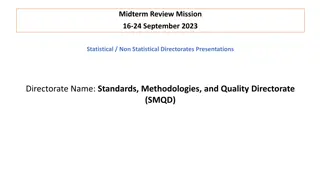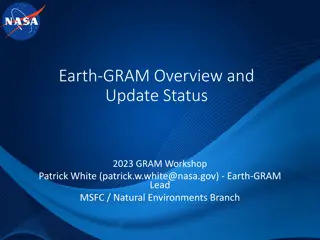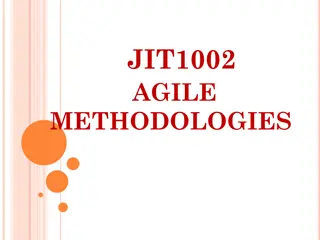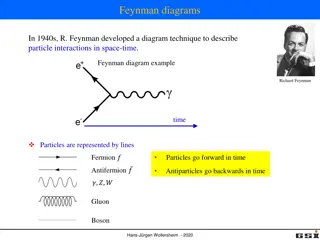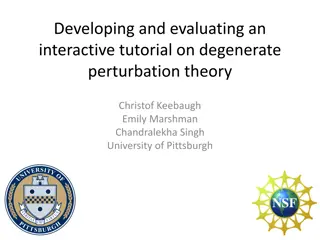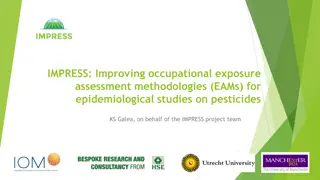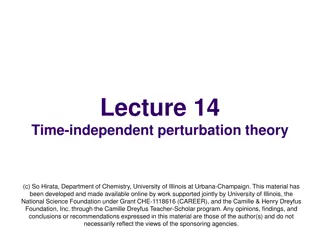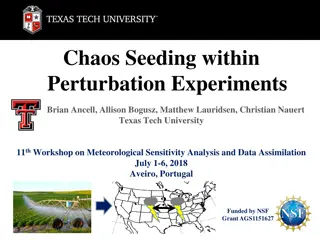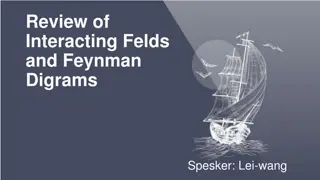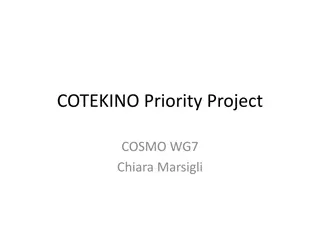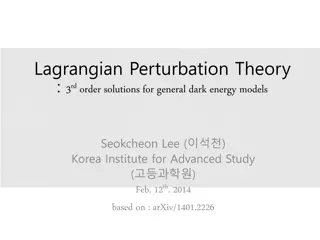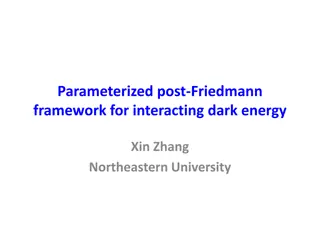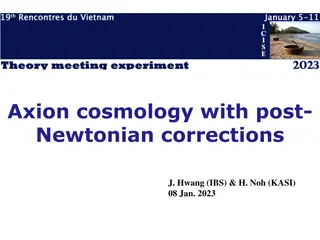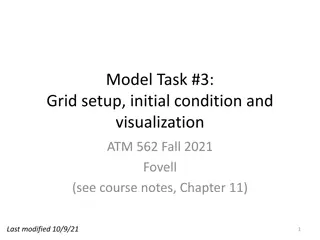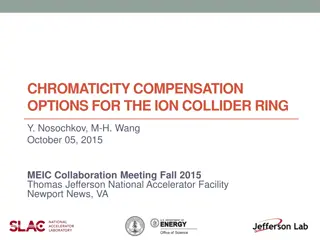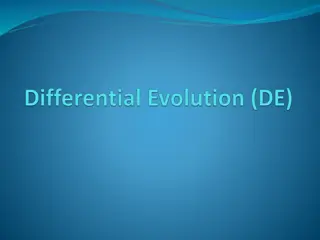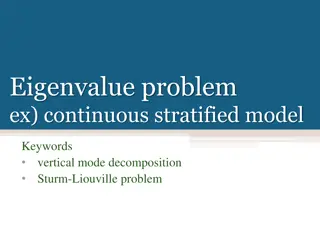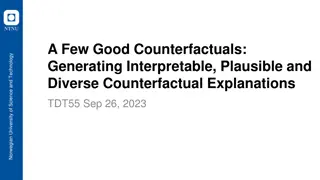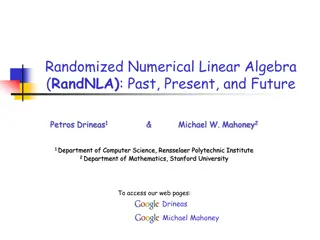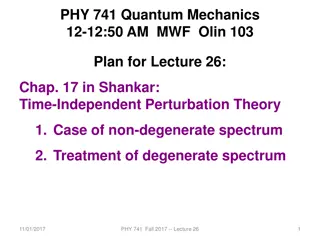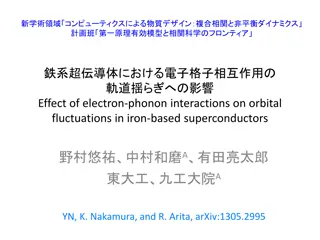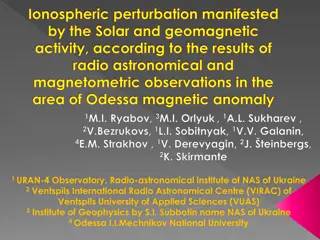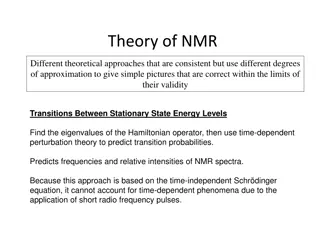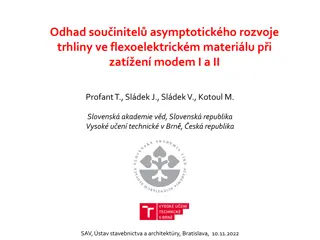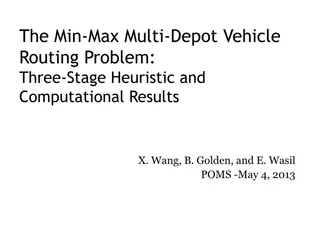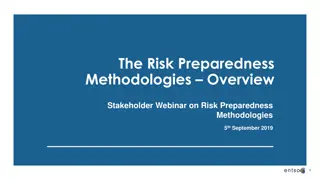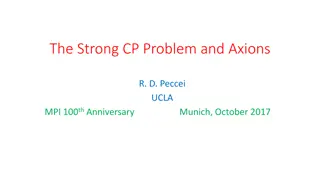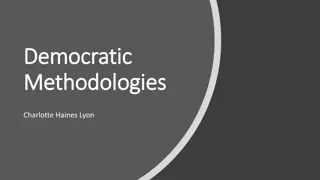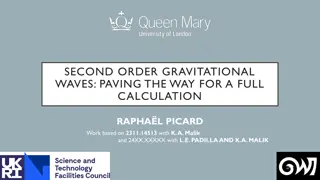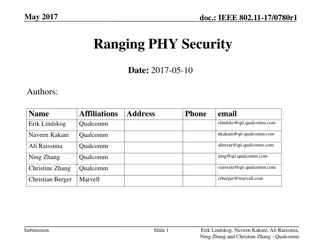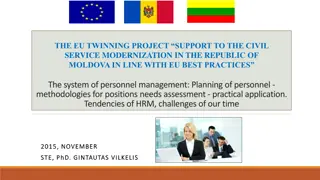Standards, Methodologies, and Quality in Statistical Programs and Services
This presentation highlights the role of the Standards, Methodologies, and Quality Directorate in overseeing statistical programs and services. It covers topics such as quality assurance, sampling frames, statistical classifications, and user satisfaction surveys. The directorate collaborates with v
6 views • 13 slides
Earth-GRAM Overview and Updates 2023
Earth-GRAM is a global reference atmospheric model providing monthly mean and standard deviation data for various atmospheric variables. It is used in engineering for dispersion simulations but is not a forecasting model. Updates to Earth-GRAM include the Modern Era Retrospective Analysis, a global
17 views • 19 slides
Agile Methodologies: Understanding, Applying, and Improving Software Development Processes
Explore the world of Agile methodologies in software development, covering basic concepts, various methodologies, testing principles, and quality assurance. Dive into Agile practices, project management, metrics, and global development. Recommended textbooks and references provided for in-depth lear
2 views • 33 slides
Feynman Diagrams in Particle Physics
Feynman diagrams, developed by Richard Feynman in the 1940s, are a graphical technique to represent particle interactions in space-time. These diagrams use lines to depict particles, with fermions moving forward in time and antifermions moving backward. Vertices in the diagrams represent points wher
5 views • 19 slides
Interactive Tutorial on Degenerate Perturbation Theory: QuILT Development and Student Difficulties
Developing an interactive tutorial on Degenerate Perturbation Theory (DPT) to aid students in understanding the challenging synthesis of Quantum Mechanics concepts with Linear Algebra. The tutorial focuses on addressing common student difficulties, such as identifying good bases, diagonalizing matri
1 views • 12 slides
Enhancing Pesticide Exposure Assessment for Epidemiological Studies
Focuses on IMPRESS project aiming to improve methodologies for assessing occupational pesticide exposure in epidemiological studies. Reviews challenges in retrospective exposure assessment, proposes methodologies, and presents key project results to date, emphasizing the use of various exposure asse
2 views • 15 slides
Time-Independent Perturbation Theory in Quantum Mechanics
Perturbation theory is a powerful tool in solving complex physical and mathematical problems approximately by adjusting solutions from a related problem with known solutions. This theory allows for more accurate approximate solutions by treating the difference as a small perturbation. An example inv
5 views • 19 slides
Investigating Chaos Seeding in Perturbation Experiments
This research project conducted at Texas Tech University delves into the effects of chaos seeding within perturbation experiments on atmospheric conditions, with a focus on local and nonlocal modifications resulting from factors such as irrigation, wind farms, and urban development. By analyzing tin
3 views • 24 slides
Interacting Fields and Feynman Diagrams in Quantum Field Theory
Delve into the fascinating world of quantum field theory with a focus on interacting fields and Feynman diagrams. Explore perturbation theory, correlation functions, Wick's theorem, and Feynman diagram rules to gain insights into preserving causality, calculating two-point correlation functions, and
5 views • 18 slides
COTEKINO Priority Project Summary
COTEKINO Priority Project involved developing and testing perturbation methodologies for convection-permitting ensembles across various operational weather services. Tasks included deriving perturbations, testing models, and coordinating with different agencies. The project aimed to enhance forecast
1 views • 9 slides
Lagrangian Perturbation Theory: Applications in Cosmology
Lagrangian Perturbation Theory (LPT) offers solutions for general dark energy models and is crucial for upcoming large-scale surveys. It provides a method to displace particles at large scales efficiently. While Standard Perturbation Theory (SPT) is limited at linear order, LPT overcomes its drawbac
4 views • 14 slides
Parameterized Post-Friedmann Framework for Interacting Dark Energy
Dive into the complexities of considering interacting dark energy (IDE) using a parameterized post-Friedmann framework. Learn why IDE is essential, how to detect couplings, calculate perturbation evolutions, and address instability issues. Explore the one-parameter extensions like wCDM and I.CDM, an
1 views • 18 slides
Axion Cosmology with Post-Newtonian Corrections
Exploring axion cosmology with post-Newtonian corrections, this study delves into linear density perturbations for dust, the role of axion as a cold dark matter candidate, and fully nonlinear perturbation formulations. It addresses continuity, momentum conservation, and quantum stress to identify ke
4 views • 22 slides
Atmospheric Modeling Task with Initial Conditions and Grid Setup
Create a model grid with 2D arrays for prognostic variables, set initial dry and adiabatic environmental conditions, introduce thermal and pressure perturbations, and visualize using GrADS. Define variables like velocities, perturbation temperature, and pressure fields, along with base state variabl
0 views • 27 slides
Chromaticity Compensation Options for the Ion Collider Ring
The MEIC Interaction Region faces challenges due to high beta functions causing chromatic perturbation. To address this, local compensation through Chromaticity Compensation Block (CCB) with sextupoles is proposed. Three CCB options are presented for consideration. The report explores the impact of
4 views • 17 slides
Differential Evolution: An Overview of the DE Algorithm
Differential Evolution (DE) is an Evolutionary Algorithm (EA) proposed for continuous function optimization. It uses vector differences to perturb the population, deviating from traditional crossover and mutation methods. DE involves mutation, perturbation, and various mutation schemes like DE/rand/
2 views • 20 slides
Governing Equations and Model Reduction in Continuous Stratified Models
Detailed analysis of the governing equations in a continuous stratified model with vertical mode decomposition and Sturm-Liouville problem. The density perturbation and pressure perturbation are examined to derive a reduced 3D system. The Boussinesq approximation and hydrostatic balance are applied,
2 views • 36 slides
Computational Complexity in Quantum Hamiltonians
The Bose-Hubbard model is proven to be QMA-complete, indicating the challenge in solving ground energy problems in quantum systems. Various classes of Hamiltonians, such as k-local and stoquastic, exhibit different complexities in computing ground energy. While some systems with QMA-complete ground
5 views • 40 slides
Enhancing Counterfactual Explanations for Improved Understanding
This article explores the concept of generating interpretable, diverse, and plausible counterfactual explanations within explainable AI (XAI). It highlights the challenges with current methods, introduces an instance-guided approach, and emphasizes the importance of good counterfactuals. The discuss
4 views • 22 slides
Randomized Numerical Linear Algebra (RandNLA)
Delve into the world of RandNLA, where randomization and sampling techniques are utilized to design accurate algorithms for handling massive matrices and computationally complex problems. Learn about sampling rows/columns, matrix perturbation theory, and its applications in Big Data, theoretical com
3 views • 83 slides
Degenerate Perturbation Theory in Quantum Mechanics
Exploring time-independent perturbation theory, specifically focusing on non-degenerate and degenerate spectra. The lecture covers approximation schemes, treatment of multi-electron atom term values, and the effects of spin-orbit interaction. Concepts include evaluating expectation values, wavefunct
2 views • 13 slides
Electron-Phonon Interactions in Iron-Based Superconductors
This discussion explores the effects of electron-phonon interactions on orbital fluctuations in iron-based superconductors. Topics covered include ab initio downfolding for electron-phonon coupled systems, evaluation methods such as Constrained Random Phase Approximation (cRPA), Constrained Density-
4 views • 12 slides
Study on Ionospheric Perturbation Due to Solar and Geomagnetic Activity in Odessa Magnetic Anomaly
Research conducted in the area of the Odessa magnetic anomaly investigates ionospheric perturbations caused by solar and geomagnetic activity. The study utilizes radio astronomical and magnetometric observations from various observatories, highlighting the significance of the geomagnetic anomaly nea
5 views • 18 slides
Insights into Theoretical Approaches in NMR Spectroscopy
Theoretical approaches in NMR spectroscopy encompass diverse methods, each with varying degrees of approximation but yielding correct results within their validity. Techniques such as transition probabilities using the time-dependent perturbation theory, Zeeman interaction for energy level transitio
0 views • 32 slides
Flexoelectric Materials and Their Asymptotic Behavior in Crack Development
Explore the utilization of asymptotic approaches to analyze crack development in flexoelectric materials, considering the influence of intensity of applied stress, limitations, advantages, and the connection to singular perturbation methods. Discover the intriguing property of flexoelectric material
0 views • 17 slides
Heuristic Approach for the Min-Max Multi-Depot Vehicle Routing Problem
This study explores a three-stage heuristic to solve the Min-Max Multi-Depot Vehicle Routing Problem (MDVRP), aiming to minimize the maximum distance traveled by vehicles. It covers an introduction to the problem, literature review, the importance of the min-max objective, and a heuristic solution m
0 views • 21 slides
Risk Preparedness Methodologies Overview
In a webinar conducted on 5th September 2019, ENTSO-E proposed methodologies for electricity risk preparedness regulation, crisis scenario identification, short-term adequacy assessment, and more. The project status report outlines the ongoing review process, public consultation, and upcoming steps.
3 views • 21 slides
The Strong CP Problem and Axions
In the realm of quantum chromodynamics, the strong CP problem and the role of axions are explored, shedding light on the U(1)A problem and its resolution. The content delves into the dynamics of quark condensates, Nambu-Goldstone bosons, and lattice QCD calculations unveiling the absence of U(1)A sy
2 views • 48 slides
Democratic Methodologies
The realm of democratic methodologies through disruptive engagement and ethical considerations. Dive into participatory research and challenges faced in furthering democracy. Discover the disruptions caused by willful participants and researchers going against the common will. Join the discourse on
3 views • 14 slides
Chaos Seeding and its Effects
The images and content discuss an inadvertent weather modification project aiming to determine atmospheric effects from various sources such as irrigation, wind farms, and urban development. The project explores both local and nonlocal modifications, highlighting potential downstream impacts. Throug
1 views • 23 slides
Revealing Scalar-Induced Gravitational Waves: A Detailed Analysis
Exploring the realm of second-order gravitational waves in the context of perturbation theory, this work delves into the intricate calculations and implications of scalar-induced gravitational waves during radiation domination. The study investigates the direct link between inflation, smallest scale
3 views • 31 slides
Techniques for Protecting Frames in IEEE 802.11-17/0780r1 Ranging PHY Security
Explore techniques described in the May 2017 document to safeguard ranging measurements at the PHY level from various attacks such as denial-of-service, perturbation, and spoofing attacks. The document also presents an example overlay attack on NDP-based ranging and discusses example PHY security te
2 views • 11 slides
Civil Service Modernization in Moldova: HR Management Methodologies and Best Practices
Explore the EU Twinning Project supporting civil service modernization in Moldova, focusing on HR management methodologies, personnel planning, and challenges in HRM. Learn about the role of HR units, needs assessment, and application of methodologies in personnel management. Discover methods like c
0 views • 25 slides
Time-Dependent Perturbation Theory in Quantum Mechanics
Delve into time-dependent perturbation theory in quantum mechanics through topics like general treatment to first order, sudden approximation, adiabatic approximation, and resonant phenomena. The lecture explores the treatment of time-dependent perturbations using complete basis sets and perturbatio
0 views • 12 slides
Quantum Adiabatic Perturbation Theory Overview
Explore Quantum Adiabatic Perturbation Theory in this comprehensive overview by Nicholas Cariello, covering motivation, adiabatic analysis, implementation on a quantum computer, and conclusions. Supported by the U.S. Department of Energy and facilitated by the Facility for Rare Isotope Beams.
2 views • 14 slides
Understanding Perturbation Methods in Classical Mechanics and Electromagnetism
Explore the concept of perturbation methods in classical mechanics and electromagnetism through examples and explanations. Learn how to tackle complex differential equations by simplifying them iteratively for easier solutions and accurate trajectories. Discover the Lindstedt-Poincare method as an a
4 views • 15 slides
Matrix Conditioning and Perturbation Analysis Techniques
Dive into the world of matrix conditioning, perturbation analysis, and scaling techniques to understand how small changes in matrices and vectors can impact solution accuracy. Learn about condition numbers, sensitivity to perturbations, and the importance of scaling for better computational accuracy
0 views • 26 slides
Comparative Analysis of Agile Software Development Methodologies
Explore a comparative analysis of Agile software development methodologies including Scrum, Extreme Programming, and Kanban. Learn about the transition to Agile from traditional approaches, the benefits of Agile development, and the key methodologies utilized in the software industry. Discover how A
1 views • 14 slides
Understanding Feynman Diagrams and Perturbation Theory in Quantum Physics
Explore the concepts of Feynman diagrams and perturbation theory in quantum mechanics and quantum field theory. Learn about their motivations, applications in experimental physics, and graphical representations for simplifying complex calculations.
1 views • 14 slides
Stationary Perturbation Theory Applications
Explore the applications of stationary perturbation theory in various subjects such as the unperturbed Hamiltonian, determining the scale of perturbation, and perturbing the hydrogen atom. Learn about estimating energy and wave functions, analyzing polynomial perturbations, and more.
1 views • 6 slides
